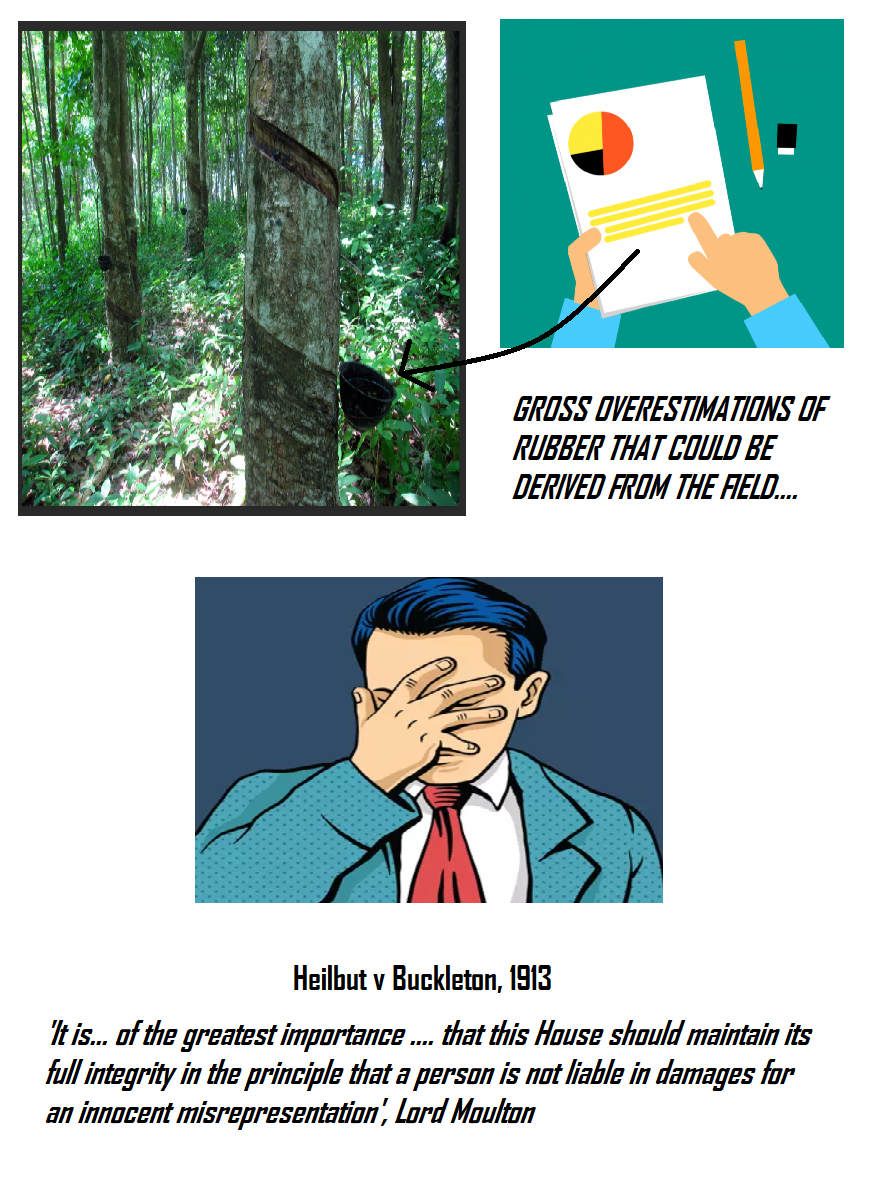Heilbut, Symons and Co. v Buckleton, 1912 UKHL 2 [1913] AC 29
Citation:Heilbut, Symons and Co. v Buckleton, 1912 UKHL 2 [1913] AC 29
Rule of thumb:Where someone can show that a misrepresentation was made innocently the other party will not be entitled to damages – this is important for facilitating commerce as it allows people to negotiate freely and openly without fear – this is a pillar of the misrepresentation principle.
Background facts:
The basic facts of this case were that Buckleton's rubber business was in the processes of starting up. Buckleton sought investent from Heilbut for this. Buckleton was asked about the growth of the business which did not come to pass later on. Heilbut bought shares in Buckleton's because they were impressed with the answers of Buckleton. The money from the shares was invested in the rubber business but it turned out to have less trees coming to fruition than anticipated – this meant that Heilbut’s shares were valued at much less than what they paid for them. Heilbut looked in greater detail at the answers to their questions that Buckleton provided. Heilbut sought the opinion of a rubber expert and Heilbut discovered that these answers were not just over ambitious but were technically wrong and had no chance of being achieved. Heilbut sued Buckleton for their losses and damages upon their shares as well as the reduction of the contract.
Parties argued
Heilbut argued their case that Buckleton had made a negligent misrepresentation and that they were owed the damages. Buckleton argued that he was a newcomer in the field of rubber manufacturing and that the answers he provided were honest answers based upon his own calculations. Buckleton explained the rationale for how he made his calculations which did have a certain theory behind it that he believed in, albeit experienced people in the field knew better than him. Buckleton further argued that he had invested all the money in the rubber business in good faith.
Judgment:
The Court upheld the arguments of Buckleton. The Court held that this could entitle them to reduce the contract but did not entitle them to damages. The Court affirmed that where someone can show that they made misrepresentations honestly and acted in good faith then they are not liable for the damages of this. Buckleton did not have to pay the Heilbut investors back their money that they had invested in his rubber business.

Ratio-decidendi:
‘It is, my Lords, of the greatest importance, in my opinion, that this House should maintain in its full integrity the principle that a person is not liable in damages for an innocent misrepresentation, no matter in what way or under what form the attack is made. In the present case the statement was made in answer to an inquiry for information. There is nothing which can by any possibility be taken as evidence of an intention on the part of either or both of the parties that there should be a contractual liability in respect of the accuracy of the statement. It is a representation as to a specific thing and nothing more’, Lord Moulton
'It is... of the greatest importance .... that this House should maintain its full integrity in the principle that a person is not liable in damages for an innocent misrepresentation', Lord Moulton.
Warning: This is not professional legal advice. This is not professional legal education advice. Please obtain professional guidance before embarking on any legal course of action. This is just an interpretation of a Judgment by persons of legal insight & varying levels of legal specialism, experience & expertise. Please read the Judgment yourself and form your own interpretation of it with professional assistance.

